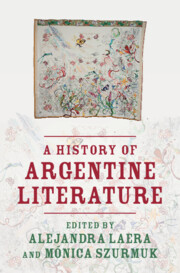Book contents
- A History of Argentine Literature
- A History of Argentine Literature
- Copyright page
- Contents
- Figures
- Contributors
- Editors’ Acknowledgments
- Introduction
- Part I Literary Dates
- Chapter 1 1536: The Creation of a Literary Space
- Chapter 2 1810: Patriotic Voices
- Chapter 3 1837: The Foundation of a National Literature
- Chapter 4 1884: A Literary Field in Formation
- Chapter 5 1910: A Modern Lettered City
- Chapter 6 1926: Traditions Old and New
- Chapter 7 1948: Culture and the State
- Chapter 8 1963: Experimentation and the Common Reader
- Chapter 9 1980: Memory and the Novel
- Chapter 10 2001: Argentine Narrative in the New Millennium
- Part II Critical Inroads
- Part III Literary Names
- Index
- References
Chapter 3 - 1837: The Foundation of a National Literature
from Part I - Literary Dates
Published online by Cambridge University Press: 09 May 2024
- A History of Argentine Literature
- A History of Argentine Literature
- Copyright page
- Contents
- Figures
- Contributors
- Editors’ Acknowledgments
- Introduction
- Part I Literary Dates
- Chapter 1 1536: The Creation of a Literary Space
- Chapter 2 1810: Patriotic Voices
- Chapter 3 1837: The Foundation of a National Literature
- Chapter 4 1884: A Literary Field in Formation
- Chapter 5 1910: A Modern Lettered City
- Chapter 6 1926: Traditions Old and New
- Chapter 7 1948: Culture and the State
- Chapter 8 1963: Experimentation and the Common Reader
- Chapter 9 1980: Memory and the Novel
- Chapter 10 2001: Argentine Narrative in the New Millennium
- Part II Critical Inroads
- Part III Literary Names
- Index
- References
Summary
In what is now known as Argentina, the year 1837 marked the birth of a modern, historically grounded understanding of literature and culture. It also marked the emergence of a generation (later known as the Generation of 1837) with far-reaching influence on the life of the country – including its first constitution, the public education system, and the drive to write national literary histories. Since then the preoccupation with what makes Argentina and its literature unique, and its present unlike its past, has not ceased to be a central trait of national culture. This chapter argues for the relevance of interpreting 1837 writers – in particular, Esteban Echeverría, Domingo F. Sarmiento, and Juan B. Alberdi – as our contemporaries, in the sense that we are still enmeshed in the modern project that, we think, they inaugurated. This is the case despite, or precisely because of the fact that their Eurocentric and exclusionary views have been increasingly evident in the public sphere. Showing that they were the first Argentine intellectuals for whom texts were understood and mainly valorized because of their location, author, and moment of production, this chapter offers clues into their foundational status.
- Type
- Chapter
- Information
- A History of Argentine Literature , pp. 39 - 51Publisher: Cambridge University PressPrint publication year: 2024

